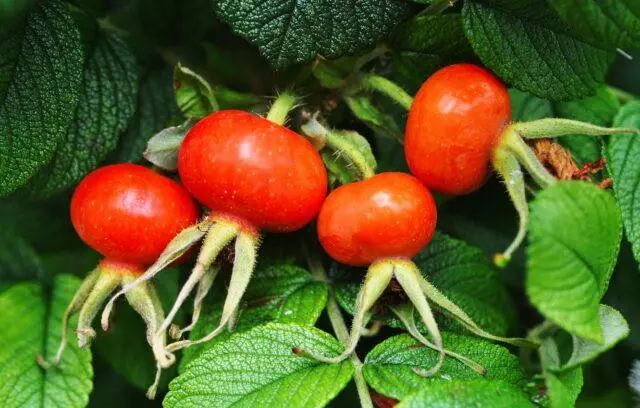Contents
Rosehip in diabetes has a certain benefit. It helps lower blood sugar levels by improving insulin absorption. Also, the components of the berry stimulate the functioning of the pancreas, strengthen blood vessels and normalize blood flow, which favorably affects pressure and heart function. The berry does not contain many simple sugars, so it can be consumed in moderation in diabetes.
Is it possible to drink rose hips with diabetes
Rosehip is not a panacea for the disease. But in its composition there are substances that lower the level of glucose in the blood.
The glycemic index of this product is 25 units out of 100. For comparison: the same indicator for apples, buckwheat – 45, whole grain flour – 40-50, orange – 35, pomegranate – 35. The share of simple sugars (glucose, fructose and others) reaches 8% by weight. This means that the berries are quite safe to consume in any type of diabetes – the first and second.
In what form can a diabetic take rose hips
Rosehip can be consumed fresh, as well as in drinks:
- tea;
- decoction;
- infusion;
- jelly.
Berries can also be mixed with other ingredients, for example, with currant leaves, orange slices, to get not only a tasty, but also a fragrant drink. However, diabetics severely limit (and in some cases completely prohibit) the use of sugar.
Despite the fact that rosehip tea or decoction has a peculiar taste, you should not put a lot of granulated sugar, jam, honey and other similar products into it.

Rosehip-based syrup, which is sold in pharmacies and stores, is excluded from the diabetic menu or severely limited due to its high sugar content
What is useful rosehip for diabetes
The composition of the berries includes quite a lot of valuable substances – organic and mineral:
- Vitamins of groups B, E, A, C are vital for ensuring normal metabolic processes.
- Pectins improve the functioning of the digestive organs, remove excess cholesterol and bile acids.
- Carotenes help to strengthen the immune system, increase a person’s endurance, and activate the processes of cell renewal.
- Minerals (compounds of magnesium, zinc, iron, calcium, sodium, potassium) provide immunity, maintain water balance, normal functioning of all vital systems.
- Essential oils have a beneficial effect on the respiratory system.
- Organic acids (citric, malic, oleic) help prolong youth.
- Tannins act as a natural antiseptic. They destroy bacteria.
The medicinal properties of rose hips in diabetes are due to the fact that it helps to improve the absorption of insulin. Therefore, the level of glucose in the blood decreases, which is especially important for diabetics.
Rosehip has other useful qualities. Regular consumption of berries in tea, decoctions and other drinks has a beneficial effect on the human body:
- stabilizes blood pressure;
- strengthens the walls of blood vessels;
- thins the blood and improves blood flow;
- promotes the healing of minor wounds;
- acts as a choleretic agent;
- strengthens the immune system and promotes recovery after illnesses.
How to brew and drink rose hips with diabetes
The main way to consume berries is in the form of drinks. They can simply be put in tea and steamed for a few minutes. But many housewives prefer to cook compote or jelly. However, during brewing, many useful substances (including vitamin C) are destroyed, so the medicinal properties of such a drink will be lower.
Fruits can be used not only fresh, but also dried. They retain all the useful qualities, taste and aroma. You can use frozen berries. They are also valuable, but stored less than dried ones.

Rose hips can be used for diabetes of any type
Rosehip infusion for diabetes
Water infusion with a disease can be used several times a week. If the drink is without additional sugar, then it can be drunk every day in moderate doses. You can prepare the infusion yourself, taking only two ingredients:
- fresh or dried fruits – 20-30 pieces;
- boiling water – 1 l.
You need to act this way:
- If the berries are dried, they are poured with hot water (in a small amount) and steamed.
- Then transfer to a blender and grind thoroughly.
- The resulting cake is poured into a thermos.
- Pour in boiling water and close the lid.
- Leave for 5-6 hours (preferably overnight), after which the drink is ready. It can be strained and drunk instead of tea.
Rosehip decoctions for type 1 and type 2 diabetes
Diabetics can use rosehip decoction regardless of the type of disease. A drink is prepared from the following components:
- berries – 20–30 pcs.;
- water – 1 l.
The instruction is simple:
- Put water on fire, bring to a boil.
- Rinse the fruits and add them at the moment of boiling.
- Cook for five minutes over moderate heat.
- Wrap in a towel and let stand for 4-5 hours, then strain. Can be stored in the refrigerator, but no more than two days.
Tea
Tea is an express version of the rosehip drink that can be consumed in type 1 and type 2 diabetes. For cooking take:
- 5–7 fruits;
- a glass of boiling water (200-250 ml);
- 1 slice of lemon.
Algorithm of actions:
- Sort the berries and pour boiling water.
- Cover the glass with a ceramic lid, let stand for 10-15 minutes.
- Add lemon or juice from it.
- By agreement with the doctor, you can drink a drink with a small amount of honey.

Rosehip tea helps to strengthen the immune system and normalizes blood sugar levels
kissel
To prepare jelly, you need the following products:
- berries – 1 cup (150-200 g);
- granulated sugar – 5 tbsp. l .;
- starch – 2 Art. l .;
- water – 1 l.
There are several stages in the recipe technology:
- Put a pot of water on the fire, bring to a boil.
- Add berries. It takes 15 minutes to cook.
- The container is insulated with a towel and insisted for six hours.
- Strain and add sugar.
- Starch is diluted in a glass of chilled infusion.
- The rest of the drink is again brought to a boil. Gradually introduce a solution of starch, mix thoroughly.
- Bring to a boil and immediately turn off, allow to cool.
Противопоказания
Despite the fact that rose hips can be used in diabetes, in some cases, its use is contraindicated. And this is due not to diabetes, but to other pathologies:
- Individual intolerance to individual components. If there are spots, itching and other allergic reactions, the reception should be discontinued. As a rule, those people who are allergic to citrus fruits suffer. If there is no certainty, it is better to start with a small dose to check the body’s response.
- Gastritis with high acidity, peptic ulcer of the stomach and duodenum: rose hips contain vitamin C and other organic acids that can aggravate the situation.
- Urolithiasis (regardless of whether or not there is diabetes mellitus). Rose hips contain vitamin C, which promotes the formation of stones.
- Predisposition to increased blood clotting (often hereditary, rarely acquired).
- Hypotension: rose hips help lower blood pressure, so patients with readings below 110/70 should not eat this berry (both with and without diabetes).
All described contraindications are not absolute. The use of wild rose in diabetes is allowed even in the early stages of pregnancy and during lactation. If there are chronic diseases, it is better to consult a doctor to clarify the allowable amounts.

In the presence of certain diseases, the use of wild rose is contraindicated
Recommendations of doctors
Doctors agree that rose hips can be used in diabetes mellitus. At the same time, it should be considered only as an additional treatment, without neglecting the main course of therapy. It is also recommended to pay attention to such useful tips:
- It is permissible to drink tea with honey, sugar, jelly in small quantities 2-3 times a week. Sugar can have a bad effect on well-being, and jelly always contains starch, which, when digested, also gives glucose.
- Drinking pure juice or a concentrated solution is not recommended, as it can corrode tooth enamel.
- Excessive consumption of rose hips in diabetes mellitus (in any form) can lead to impaired liver function, in rare cases, to the development of jaundice.
- The use of berries in large quantities can lead to constipation, which is especially dangerous for older people.
- You can give rose hips to children only from the age of three.
- Pregnant women with diabetes can eat berries in any form, but only in consultation with the doctor.
- During lactation, a drink based on rose hips is indicated, as it helps to increase the production of breast milk.
Conclusion
Rosehip in diabetes can be consumed, but with a restriction on honey, syrup, jam and other products containing glucose and fructose. There is no strict dosage: drinks based on berries can be used even every day (in reasonable quantities). Therefore, you can prepare tea or a decoction in advance and drink it for 2-3 days, and then make a new portion.









